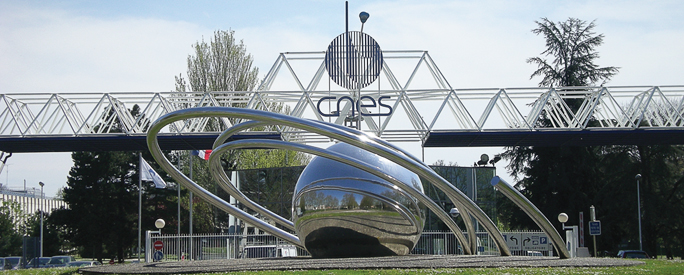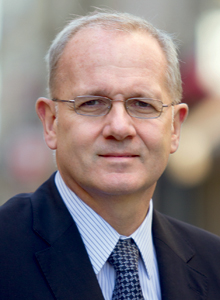2017-01-09
UAE’s advances in space are impressive: Jean-Yves Le Gall
The president of CNES says space is the best way to ensure the harmonious development of the Middle East
By: Sakha Pramod
UAE is all set to host the Global Space Congress on 31 January and 1 February at the St Regis Hotel on Saadiyat Island, Abu Dhabi. Ahead of the prestigious event, Nation Shield spoke to Jean-Yves Le Gall, the President of the Centre National d’Etudes Spatiales (CNES), the French space agency on issues ranging from UAE’s increasing role in space exploration to the challenges posed by global warming. Excerpts:
You have been the President of the Centre National d’Etudes Spatiales (CNES), the French space agency, since 2013. How do you view UAE’s efforts in space?
The advances the UAE has achieved in space in the last decade are indeed impressive, especially its series of small Earth-observing satellites and the government’s decision to create a national space agency in 2015 to step up its commitment to invest in space. Today, the UAE’s space program stands out in the region in seeking to extend its spectrum of activities to science and exploration.
In this regard, the HOPE project to send a mission to Mars has brought a new dimension to its space program and I think this is going to bring a positive dynamic across the Middle East. I also appreciate the UAE’s willingness to engage in partnerships, as illustrated through its involvement in a number of multilateral initiatives like the International Space Exploration Coordination Group (ISECG) and the United Nations Committee On the Peaceful Uses of Outer Space (COPUOS).
Do you think a young country like the UAE is justified in investing in space sciences? What dividends can it expect to reap for its people and the world at large?
Investing in space is something that should be within the reach of all nations, since today the level of involvement can be tailored to available budget resources, notably through international partnerships. Concerning science missions, we see in Europe for example that certain nations with limited budget resources are now able to contribute to projects they could never have accomplished alone, and from which they are gaining industrial and scientific benefits. Experience also shows that space is a great way to inspire and motivate young generations, giving them a handle on the rich range of career prospects that science has to offer outside the space sector.
The UAE Space Agency is to host the first Global Space Congress in Abu Dhabi next year. As the interministerial coordinator for satellite navigation programmes and Chair of the Administrative Board of GSA, the European GNSS Agency, how would you describe this initiative?
The UAE is often the focal point for international events in the Middle East, but the Global Space Congress is the only one in the region truly dedicated to space. The UAE’s good air links and availability of high-quality accommodation mean that both Asian and Western space players will be well represented. The Global Space Congress has all set to become a must-attend event for the space community.
What will be your focus at the Congress scheduled to take place on 31 January and 1 February?
I intend to underline the crucial role that satellites are playing in support of efforts to curb climate change. Today, satellites are vital tools for studying and preserving our climate, enabling us in particular to observe 26 of the 50 essential climate variables identified by experts. At CNES, we are developing with our European partners a new generation of satellites designed to measure greenhouse gas emissions, like MicroCarb to monitor carbon gas and MERLIN to track methane.
We are also working with the United States on satellites measuring sea-surface height like the Jason series and SWOT to observe the globe’s oceans, lakes and rivers. The world’s space agencies have fully grasped what is at stake here and have committed to join forces and pool their resources to tackle global warming, as evidenced by the New Delhi Declaration that came into effect this year.
They also played a pivotal role at the COP22 in Marrakesh in November, where the UAESA Chairman’s speech attracted a lot of attention. At the COP21 in 2015 in Paris, the UAE government had previously expressed its concerns about the major impact that climate change could have in your country, especially on water resources and on infrastructures along its seaboard. For example, Saadiyat Island, where the Global Space Congress is to be held, concentrates a lot of infrastructures near the coastline. So, urban planning agencies are going to have to gear up to respond to a long-term rise in sea level.
CNES is responsible for proposing and implementing space policy in France. What kind of collaboration do you have with the UAE Space Agency?
We signed a framework cooperation agreement with UAESA last year and we really appreciated the fact that it was the first such agreement your agency has signed with an international partner. We are currently working to identify areas of shared interest in research and development that we could co-fund.
When we find partners who are ready to invest with us in developing new technologies, we are ready to bring to bear all of the experience we have acquired over the decades since our agency’s inception in 1961. And of course our ties in space should be viewed within the broader perspective of relations between our two countries. Indeed, space is one of the five key threads of the France-UAE Strategic Dialogue.
As a scientist and engineer, you have devoted your entire career to the European space programme. What advice would you give to fledgling space powers like the UAE about the areas they should focus on in the initial stage?
New entrants in the space sector today are fortunate in having readily available technologies that have taken decades to mature and they are now embracing the era of space applications. For example, many nations are now capable of developing small Earth-observing satellites operating at resolutions that would have been classified in the United States in the 1990s. I believe a space agency must align its priorities with those of its country.
But of course that means priorities must be clearly identified through close dialogue with ‘end-users’ like ministries and local authorities. Looking through the Abu Dhabi Vision 2030 document, I see lots of priorities like sustaining resources and the environment that could gain great benefit from using satellite applications.
Do you see a talent gap in the segment in countries like the UAE and if so, how can it be overcome?
The UAE’s universities are clearly producing world-class engineers, but it is through international exchanges and by testing our knowledge with others that we progress. I would therefore encourage French universities to forge ties with their Emirati counterparts and set up student exchange programmes that work both ways. CNES has already hosted several engineers from UAESA in Toulouse for training in space technologies, and that is something we intend to pursue in the future.
What are the emerging new frontiers in space technology that could change the way people live today?
Space is already a ubiquitous feature of our daily life and has been changing it almost imperceptibly for several years now. Try imagining if all satellites stopped operating tomorrow morning and you will see just how dependent on them we are for everyday applications like weather forecasting, television, bank transfers or simply finding our way around.
One of the big challenges facing space today is to embrace ‘big data’. Imagine being able to observe the entire globe at metric resolution and acquire fresh imagery every hour. We have some way to go to get to that point, but it’s going to prove a disruptive force in many areas. Imagine, too, that we find traces of life on Mars: would that not completely transform how we live and think? The UAE is soon set to join this Martian adventure with its forthcoming HOPE mission.
How can the countries in the Middle East benefit the most from space technology and in which sectors?
The Middle East, with its complex history, is likely to feel the effects of global warming very intensely. I am thinking not only of the impact of rising sea level on coastal populations, but also of increasingly frequent extreme heat events. Satellites are the tools best able to track such changes over long periods of time, as well as the results of measures taken to mitigate them. In all, space is the best way to ensure the harmonious development of the Middle East.



No Comments